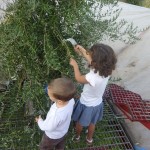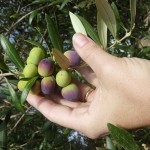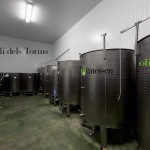With Olicatessen on your plate
the success is ensured
CRITERIONS FOR A TOP OIL
- Harvest method

As soon as you pick an olive, it starts to die. Certain enzymes become active and worsen the taste. Any damage makes it worse. Quality harvest is therefore done by hand while standing on a grid as to minimize the damage. - Little time between pick and press
It’s a traditional belief that olives should be pressed within 24 hours to keep quality. But we found that the sooner you press, the better the taste. That’s why we take each batch from every tree to the mill immediately. Maximum time between pick and press is maximum of 2 hours. THAT’S AN ESTATE OIL! - Early harvest

When you sell by the kilo, you want to wait until the olive is very mature, so you get higher performance. If you want great taste, you harvest when the olives have just start ripening. We love them green… - Press under 24º
The lower the temperature, the higher quality you get. By law, ‘cold pressed’ oil must be pressed beneath 27º – the limit at which vitamins, polyphenols and phenols survive. However, the warmer you press, the more oil comes out of the olives. And since there’s in no way proof of the press temperature afterwards, this aspect might be tempting for some…
We, at our mill, press between 14º and 24º. - Low acidity
Acidity (indicating free fatty acid content) shows to what extend the oil is ‘affected’ by any means. This could be from bad olives, improper milling or inadequate storage. Regulation allows oils with acidity up to 0,8 to be named Extra Virgin. This designation is by many seen as a criterion for quality. We think it’s a pretty broad criterion though, since real quality oils have an acidity of 0,1 or max 0,2. - Estate oil

Olicatessen comes from one estate having its own mill. That’s important to know, since only under these conditions the process can be perfected to the last detail. - Organic…of course
If our intention is to make a great quality olive oil, it must also be great on the whole, don’t you agree? Great to health, to the palate, to the environment and to our territory. We see this not only as a matter of coherence but as our responsibility too.

